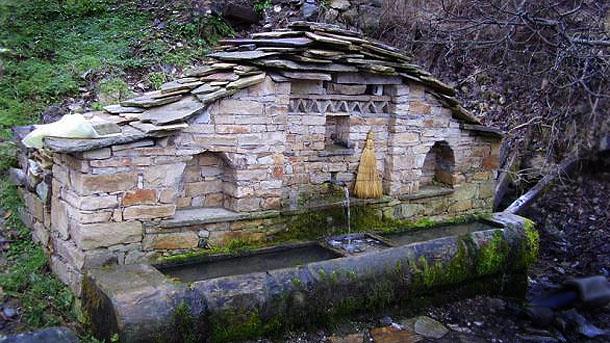Water is an invaluable natural asset, a symbol of eternity. Hence the special place water occupies in the rituals and customs of different nations, including here in Bulgaria. The cult of water has given rise to an ancient tradition – that of building drinking water fountains in places where water flows naturally.
Even people whose job it is to build drinking water fountains say building a fountain is a good deed to be remembered by. Perhaps that is the reason why there are so many drinking water fountains across Bulgaria – by the side of roads and highways, in village squares or in some “God forsaken place”. Many of them were built centuries ago and are imbued with true stories, myths and legends.
 Building a drinking water fountain is seen as a spiritual act, here in Bulgaria. And he who builds one is performing a duty, an act to be remembered by, and sometimes unburdening his soul. Life is a cup of water to be drunk and the spouts will never run dry – reads an inscription on one of the many water fountains in the Rhodopes. The wind sweeps aside our footprints – first our passions, then time engulfs us. This water fountain was built because stone is permanent, water is eternal.” This inscription hewn into a stone tablet can be seen in the Etura ethnographic complex. The master builder is unknown, but the person who commissioned the inscription has surely touched people’s hearts. Once well-off Bulgarians would commission the construction of drinking water fountains – for the good of the community, to commemorate some joyous event or in memory of a loved one. That is why inscriptions were made in which their names were made mention of. There exist innumerable variations of the words: Traveler, take a sip of water and remember… or A sip of water, remembrance for my mother…
Building a drinking water fountain is seen as a spiritual act, here in Bulgaria. And he who builds one is performing a duty, an act to be remembered by, and sometimes unburdening his soul. Life is a cup of water to be drunk and the spouts will never run dry – reads an inscription on one of the many water fountains in the Rhodopes. The wind sweeps aside our footprints – first our passions, then time engulfs us. This water fountain was built because stone is permanent, water is eternal.” This inscription hewn into a stone tablet can be seen in the Etura ethnographic complex. The master builder is unknown, but the person who commissioned the inscription has surely touched people’s hearts. Once well-off Bulgarians would commission the construction of drinking water fountains – for the good of the community, to commemorate some joyous event or in memory of a loved one. That is why inscriptions were made in which their names were made mention of. There exist innumerable variations of the words: Traveler, take a sip of water and remember… or A sip of water, remembrance for my mother…
 In the most ancient legends any water source has a master, usually a mythical creature – a water bull or wood-nymphs. Sometimes ordinary girls would be turned into wood-nymphs if they have ventured to the water fountain at night. To people of today the stories of “immurement” sound truly sinister – according to olden beliefs, if building a bridge, a water fountain or a house has gone awry, then the shadow of a living person must be “immured” into its foundations. There are many such stories about water fountains. Here is one of them: Once upon a time there was a village where the water vanished. Master builders came from afar to build a water fountain. During the day they would build it, at night it would fall to ruin. So, they decided to immure someone’s shadow, but people avoided passing by the place. One day the head master-builder went to the home of a young lass – Rada. The girl was sitting in the courtyard spinning wool and feeding the chickens. And she never even noticed as the master builder took her shadow’s measurements. Then he went back and immured her shadow into the water fountain. One day it was completed and that same day Rada fell ill and died. From then on people would see her at full moon – sitting by the water fountain, spinning.
In the most ancient legends any water source has a master, usually a mythical creature – a water bull or wood-nymphs. Sometimes ordinary girls would be turned into wood-nymphs if they have ventured to the water fountain at night. To people of today the stories of “immurement” sound truly sinister – according to olden beliefs, if building a bridge, a water fountain or a house has gone awry, then the shadow of a living person must be “immured” into its foundations. There are many such stories about water fountains. Here is one of them: Once upon a time there was a village where the water vanished. Master builders came from afar to build a water fountain. During the day they would build it, at night it would fall to ruin. So, they decided to immure someone’s shadow, but people avoided passing by the place. One day the head master-builder went to the home of a young lass – Rada. The girl was sitting in the courtyard spinning wool and feeding the chickens. And she never even noticed as the master builder took her shadow’s measurements. Then he went back and immured her shadow into the water fountain. One day it was completed and that same day Rada fell ill and died. From then on people would see her at full moon – sitting by the water fountain, spinning.
Bulgarian ethnographers have recorded many legends of the wondrous properties of water. In one village a military commander drove his spear into the ground in an empty meadow and water gushed from the spot. So, he commissioned a water fountain to be built to commemorate the miracle. There is another legend about two young people in love, whom someone tried to break up. The young people were brought together in the next world and on the spot where death overtook them a water fountain sprung from which their tears flowed.
There are many songs devoted to drinking water fountains - the place where young people would meet. And according to these songs, building a church and a water fountain is the greatest good one can ever do for others.
English version: Milena Daynova
The 14th World Folklore Championship, "World Folk 2024" , starts today and runs until August 30 at three locations on Bulgaria's Black Sea coast: Nessebar, Sunny Beach and Sveti Vlas. The event kicks off tonight at the Jana Chimbuleva Amphitheatre in the..
Esther Willems from the Netherlands continues to attract people from different cities and nationalities to her club for Bulgarian folk dances, established in The Hague and named "Zora". It was founded in 2017 and then 13 people..
In the middle of August in Kyustendil, Southwestern Bulgaria, the "Panagia - Raising of the Bread" holiday takes place. The holiday is directly related to the church holiday "Assumption of the Blessed Virgin Mary", marked on August..

+359 2 9336 661
